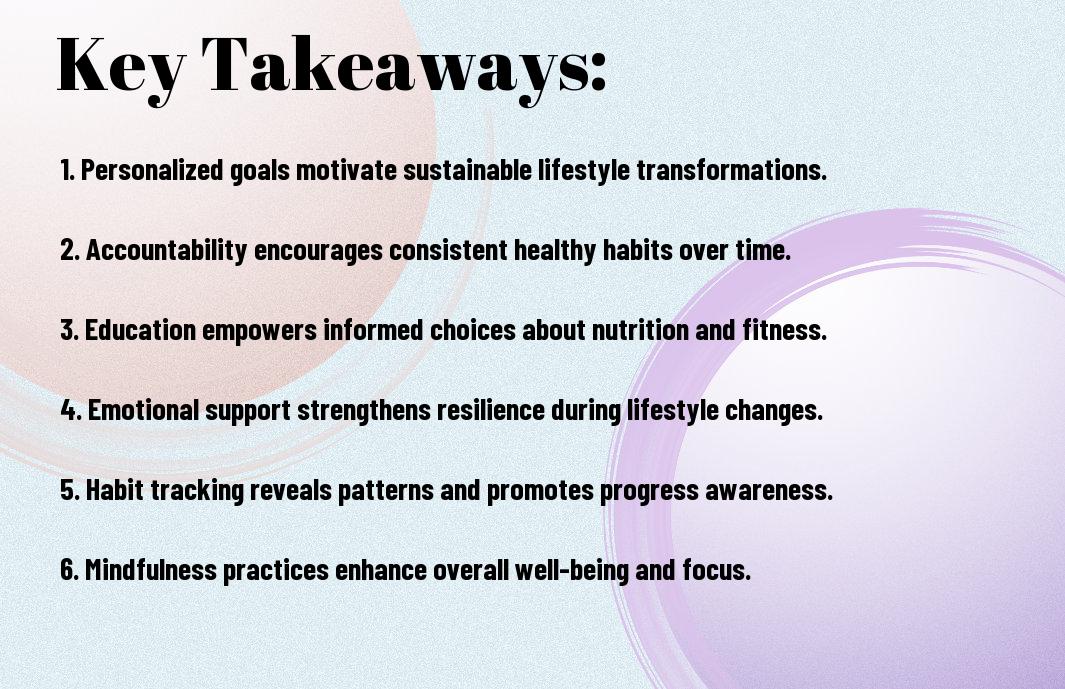Most people struggle to implement and maintain lasting healthy lifestyle changes amidst daily challenges and temptations. By engaging in lifestyle coaching, you gain personalized support and accountability that empowers you to transform your habits effectively. Coaches help you identify barriers to success, set achievable goals, and develop tailored strategies that align with your values and lifestyle. This collaborative process not only enhances your motivation but also fosters a deeper understanding of your choices, paving the way for sustainable changes that significantly improve your well-being.
Key Takeaways:
- Lifestyle coaching provides personalized support and accountability, empowering individuals to set realistic goals and make sustainable changes in their daily habits.
- Through tailored strategies and motivational techniques, lifestyle coaches help clients identify and overcome barriers, fostering resilience and enhancing commitment to health improvements.
- Coaching encourages a holistic approach to wellness, integrating physical health with mental and emotional well-being, leading to comprehensive lifestyle transformation.
Understanding Lifestyle Coaching
While many seek to enhance their well-being, lifestyle coaching offers structured support to achieve meaningful change. By focusing on your unique goals and preferences, it empowers you to make sustainable adjustments to your daily habits, ultimately leading to a healthier and more fulfilling life.
Definition and Purpose
Around the concept of lifestyle coaching lies a holistic approach that combines personal development with health and wellness. Its purpose is to guide you in evaluating your current lifestyle, identifying areas for improvement, and implementing actionable strategies that align with your personal values.
Key Principles of Lifestyle Coaching
Against conventional methods, lifestyle coaching emphasizes a personalized approach tailored to your specific needs and aspirations. It focuses on sustainable changes rather than quick fixes, fostering your ability to take charge of your health journey.
For instance, a key principle is to promote self-awareness, encouraging you to recognize patterns in your behavior and how they affect your well-being. This insight can help you set realistic goals based on your individual circumstances. Another principle is accountability; having someone to guide you can significantly boost your motivation and drive. Furthermore, lifestyle coaching emphasizes the importance of support networks, as surrounding yourself with positive influences can create a conducive environment for change. Engaging with these principles can lead you to long-lasting transformation in your life.


The Role of Lifestyle Coaches
The role of lifestyle coaches is to guide you through your journey toward healthier living. They offer personalized support, motivation, and expert advice tailored to your unique goals and challenges. By helping you identify barriers to change and creating actionable plans, lifestyle coaches empower you to take control of your health. This collaboration fosters resilience and accountability, making lifestyle changes more achievable and sustainable over time.
Qualifications and Skills
Across various fields, lifestyle coaches possess a diverse range of qualifications and skills, including expertise in nutrition, fitness, and behavioral psychology. Many hold certifications from reputable organizations and have experience in coaching individuals with similar goals. Their strong communication and interpersonal skills enhance their ability to connect with you, ensuring a supportive environment for your growth and progress.
Methods Used in Coaching
Before working with a lifestyle coach, you may want to understand the methods they typically use to facilitate change. Coaches often employ a combination of techniques, including goal-setting, motivational interviewing, and behavior modification strategies to help you achieve your desired outcomes.
Further, lifestyle coaches utilize a variety of methods tailored to your individual needs. They may implement structured assessments to identify specific areas of improvement and set manageable goals to keep your progress on track. Techniques like mindfulness practices and accountability check-ins are also common, as they encourage you to stay engaged in your journey. By utilizing a personalized approach, these methods can result in profound and lasting changes to your overall lifestyle.
Identifying Healthy Lifestyle Changes
Your journey toward a healthier lifestyle begins with identifying the specific changes that can improve your overall well-being. This process involves evaluating your current habits and understanding what adjustments will best support your health goals. By pinpointing areas for improvement, you can create a more tailored approach to your lifestyle changes that resonates with your unique needs and preferences.
Assessing Current Habits
Above all, understanding your current habits is crucial for making meaningful lifestyle changes. Conduct a thorough self-assessment by tracking your daily activities, diet, and exercise routines. This awareness will highlight both positive behaviors and areas needing adjustment, allowing you to make informed decisions about your health journey.
Setting Realistic Goals
Current goals should be specific, measurable, and achievable to promote sustainable changes in your lifestyle. By setting realistic targets, you create a roadmap that keeps you motivated and engaged in your journey toward healthier living.
In fact, establishing goals that align with your life and capabilities prevents feelings of overwhelm and frustration. When your goals are achievable and specific, it becomes easier to maintain motivation and track progress. For instance, instead of aiming to lose a large amount of weight quickly, consider setting a goal to gradually lose a reasonable amount each week. Focusing on small milestones not only boosts your confidence but allows for necessary adjustments along the way, ensuring that changes are sustainable and ultimately lead to a healthier lifestyle.
Techniques for Sustaining Change
After initiating changes in your lifestyle, it’s important to develop techniques that support long-term sustainability. This may involve setting realistic goals, regularly reviewing your progress, and implementing routines that promote consistency. By intentionally designing your environment and establishing healthy habits, you can reinforce the changes you’ve made, ensuring that they become a permanent part of your life.
Accountability and Support
For lasting change, engaging with a support network or coach can significantly enhance your commitment to your goals. Accountability partners—whether they are friends, family, or professionals—offer motivation and can help you stay on track. This external support reminds you of your goals and provides encouragement during challenging times.
Overcoming Barriers
Sustaining change often involves confronting and overcoming barriers that may hinder your progress. These can include various obstacles such as time constraints, emotional triggers, or social pressures. Recognizing these barriers is the first step toward developing effective strategies to navigate them.
But tackling barriers head-on is important for your success. Establish practical strategies to manage challenges—like creating a structured schedule for exercise or meal prep. Address emotional triggers by seeking support from a coach or therapist who can guide you through coping mechanisms. Additionally, an awareness of social pressures can empower you to advocate for your health, enabling you to share your goals openly with friends and family. By honing these techniques, you can create pathways that lead to sustained healthy lifestyle changes.
Measuring Progress and Success
Not only does measuring progress provide motivation, but it also helps you identify areas for improvement in your lifestyle journey. Regular assessments can highlight successful strategies and those that may need adjustment, allowing you to stay aligned with your health goals. Tracking your outcomes helps in evaluating whether you’re on the right path, offering insight into how effectively you’ve implemented changes and where you may need further guidance.
Tracking Lifestyle Changes
Progress in your journey is best gauged through consistent tracking of your lifestyle changes. Keeping a journal or using apps can help you monitor your eating habits, physical activity levels, and emotional well-being. By noting your daily routines and reflecting on your achievements, you can gain valuable insights that allow you to see how far you’ve come and adjust your practices to ensure ongoing success.
Celebrating Milestones
Above all, celebrating milestones along your health journey reinforces positive behavior and enhances motivation. Recognizing these moments creates a sense of accomplishment, reminding you of your hard work and dedication to change. Whether it’s achieving a fitness goal or adopting a new healthy habit, taking time to honor your achievements encourages continued commitment to your lifestyle transformation.
Understanding that celebrating milestones is an imperative part of your growth empowers you to recognize even the smallest victories. By acknowledging your progress, you enhance your motivation to continue pushing forward, solidifying your commitment to a healthier lifestyle. Incorporating rewards, whether it’s a treat, a day off, or a new workout outfit, keeps your journey enjoyable and something you look forward to. This positive reinforcement cultivates a sustainable approach that transforms your healthy changes into lasting habits.
Case Studies and Success Stories
Keep in mind the transformative potential of lifestyle coaching as demonstrated in these case studies:
- Client A lost 50 lbs in 6 months through personalized meal planning and exercise routines.
- Client B achieved a 40% reduction in anxiety levels after implementing mindfulness techniques within 3 months.
- Client C improved their cholesterol levels by 35% through dietary adjustments and consistent coaching support.
- Client D increased their physical activity by 300% over 4 months, significantly boosting their overall well-being.
Transformative Experiences
To fully appreciate the impact of lifestyle coaching, you must consider the deeply personal journeys that individuals undergo as they embrace these changes. Many clients report not only physical improvements but also enhanced emotional resilience and self-awareness, which enables them to tackle challenges more effectively.
Lessons Learned
Before launching on your own lifestyle change, you need to recognize the valuable lessons encapsulated in these coaching experiences.
In fact, clients often discover that accountability plays a significant role in maintaining progress and motivation. They learn the importance of setting realistic goals and adapting their strategies when facing setbacks. Gaining insight into their personal triggers allows individuals to make informed decisions, leading them towards lasting, positive changes in their daily lives. Implementing small, sustainable habits rather than drastic overhauls proves to be a much more efficient way to achieve your desired outcomes.
Summing up
Taking this into account, lifestyle coaching serves as a powerful tool for you to make meaningful and lasting changes in your health and well-being. By providing personalized guidance, accountability, and support, a coach empowers you to identify barriers and set achievable goals tailored to your unique circumstances. This structured approach not only helps you adopt healthier habits but also fosters a mindset shift that promotes overall wellness. Embracing lifestyle coaching can lead you towards a more balanced and fulfilling life, unlocking your potential for profound transformation.
Q: What are the key benefits of lifestyle coaching for making lasting health changes?
A: Lifestyle coaching offers personalized support that helps individuals identify their unique goals and barriers. Through tailored guidance, coaches provide strategies that are not only practical but also sustainable. This supportive relationship fosters accountability, motivation, and encouragement, making it easier for individuals to stay committed to their health objectives. Additionally, lifestyle coaches often utilize behavior change techniques that empower clients to adopt healthier habits gradually, leading to more profound and enduring changes over time.
Q: How does lifestyle coaching address the psychological aspects of health changes?
A: Lifestyle coaching investigates into the psychological factors that can impede health progress, such as stress, self-doubt, and limiting beliefs. Coaches work with clients to help them cultivate a positive mindset by setting realistic expectations and celebrating small victories. By understanding the emotional triggers that lead to unhealthy behaviors, lifestyle coaches equip individuals with coping strategies to manage cravings and emotional eating. This holistic approach not only promotes physical health but also enhances mental well-being, leading to a more balanced and fulfilling lifestyle.
Q: In what ways can lifestyle coaching be tailored to individual needs and preferences?
A: One of the significant advantages of lifestyle coaching is its adaptability to personal circumstances. Coaches often conduct comprehensive assessments to understand an individual’s lifestyle, preferences, and health history. Based on this information, they can develop customized plans that accommodate diverse dietary preferences, physical activity levels, and personal schedules. This personalization ensures that the recommended lifestyle changes are not only achievable but also enjoyable, increasing the likelihood of long-term adherence to healthier habits.

